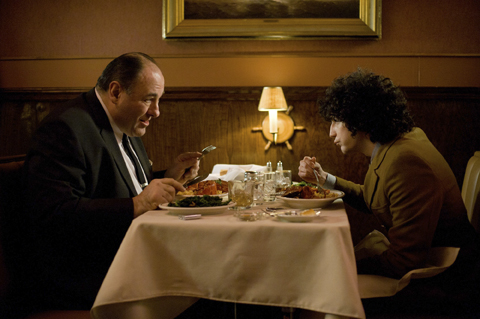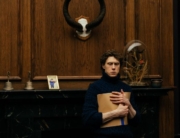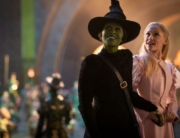
James Gandolfini, left, and John Magaro in NOT FADE AWAY (The Film Society of Lincoln Center)
Not Fade Away beautifully captures the impact of the British rock ‘n’ roll invasion on young teens in the suburbs. I know, I was there—I grew up in the next town over at the same time as writer/director David Chase, next to an Italian-American neighborhood like his, and I was pouring over the credits on 45 records at the same time as music supervisor par excellence Steven Van Zandt (collaborator with two other New Jersey cultural touchstones, in Bruce Springsteen’s E Street Band and in Chase’s The Sopranos).
There’s plenty of fiction films by boomers that have focused on teens caught up in the media phenomenon that was Beatlemania, like Robert Zemeckis’s I Wanna Hold Your Hand (1978) and Tom Hanks’ That Thing You Do! (1996). But this film throbs, showing how the music shook our lives. It opens in black and white, featuring two other pivotal moments in postwar cultural history: when TV sets became ubiquitous and Mick Jagger first bonded with Keith Richards over an American blues song by Jimmy Reed. What truly rocked our world was when the Rolling Stones appeared on U.S. TV. (I, too, bought my first rock album to keep replaying the Stones’ “Tell Me,” and the film’s title evokes more the gritty Stones’ cover than the Buddy Holly original song.)
For guys, the reaction was to pick up instruments and make a band. As the filmmaking team pointed out at the New York Film Festival’s press conference, you can’t have a garage band without a garage, and there were plenty of those in New York’s suburbs, where Doug (John Magaro) starts banging on anything, as well as growing his hair long. His ever simmering dad, Pasquale “Pat” (James Gandolfini)—yeah, one can’t help but wait to see if he’ll walk out on his driveway in his bathrobe like Tony Soprano—runs a Pep Boys auto repair shop. He and his busy, pessimistic housewife, Antoinette (Molly Price), are still in shock from the JFK assassination, but for kids, life went on. In school, Doug wants to impress a (bland) upper-middle-class girl, Grace Deitz (Bella Heathcote), whose snooty patriarch presides over a large home and at the country club (where Doug works summers).
There are lots of inside-the-ballpark musical references in the clashes of young male egos after Doug gets invited into a band, which is already arguing over creative differences. They learn cover songs for party gigs, and settle on calling themselves the Twylight Zones. On guitars are Eugene (Jack Huston, completely unrecognizable and very impressively reinvented from his damaged veteran in Boardwalk Empire) and a preening Wells (Will Brill). Too bad the film looks too much like its on-location filming in contemporary California. These well-to-do kids have McMansion-style basements that host crowded parties with live music, when I know dances with local bands were primarily at VFW halls or at high school battles of the bands, where popular Motown songs were performed more often than the blues in the film.
The actors went through a garage band “boot camp” with Van Zandt, who also wrote an original song to represent the band’s progress that lands them a potential record deal with legendary producer Jerry Ragovoy (Brad Garrett). Magaro pulls off the lead singing, sounding very (Jakob) Dylanesque.
In addition to the narration and memorable closing dance by Doug’s younger sister, the musical and cultural impact on girls is mostly represented by Grace’s older sister, Joy (Dominique McElligott). She runs off to live in Greenwich Village and discovers Dylan and folk music, like my older sister did from attending summer camp with Bonnie Raitt, who still cites that exposure as her influential font. So it’s unfortunate that Joy’s story line goes off an exaggerated mental cliff, even though she wasn’t the only one who played Sergeant Pepper’s for uncomprehending parents (like my sister and I). But in general, even with accurate details, the film loses its way as it follows the young folks for too long as they start to lose theirs into 1968, with a right-on, year-by-year soundtrack selection similar to that in countless films.
However, Chase adds a touch unfamiliar from other American films that replay when “the times were a-changin’.” Gandolfini is no stereotyped angry conservative father. When he catches South Pacific on TV, it arouses complex memories of his service in World War II. Maybe it has taken 67-year-old Chase until now to understand and sympathize with the bewildered older generation, who made all those garage bands possible by buying those suburban homes with Veterans Administration home mortgages.






Leave A Comment